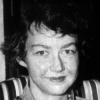Flannery O'Connor

Flannery O'Connor
Mary Flannery O'Connorwas an American writer and essayist. An important voice in American literature, she wrote two novels and 32 short stories, as well as a number of reviews and commentaries. She was a Southern writer who often wrote in a Southern Gothic style and relied heavily on regional settings and grotesque characters. Her writing also reflected her own Roman Catholic faith and frequently examined questions of morality and ethics. Her posthumously-compiled Complete Stories won the 1972 U.S. National Book...
NationalityAmerican
ProfessionNovelist
Date of Birth25 March 1925
CitySavannah, GA
CountryUnited States of America
The two worst sins of bad taste in fiction are pornography and sentimentality. One is too much sex and the other too much sentiment.
The beginning of human knowledge is through the senses, and the fiction writer begins where the human perception begins. He appeals through the senses, and you cannot appeal through the senses with abstractions.
The fiction writer has to engage in a continual examination of conscience. He has to be aware of the freak in himself.
... the main concern of the fiction writer is with mystery as it is incarnated in human life.
It seems that the fiction writer has a revolting attachment to the poor, for even when he writes about the rich, he is more concerned with what they lack than with what they have.
There is no excuse for anyone to write fiction for public consumption unless he has been called to do so by the presence of a gift. It is the nature of fiction not to be good for much unless it is good in itself.
It's always wrong of course to say that you can't do this or you can't do that in fiction. You can do anything you can get away with, but nobody has ever gotten away with much.
A story is a way to say something that can't be said any other way, and it takes every word in the story to say what the meaning is. You tell a story because a statement would be inadequate. When anybody asks what a story is about, the only proper thing is to tell them to read the story. The meaning of fiction is not abstract meaning but experienced meaning.
The fiction of Ayn Rand is as low as you can get re fiction. I hope you picked it up off the floor of the subway and threw it in the nearest garbage pail. She makes Mickey Spillane look like Dostoevsky.
The type of mind that can understand good fiction is not necessarily the educated mind, but it is at all times the kind of mind that is willing to have its sense of mystery deepened by contact with reality, and its sense of reality deepened by contact with mystery.
Even in the life of a Christian, faith rises and falls like the tides of an invisible sea. It's there, even when he can't see it or feel it, if he wants it to be there. You realize, I think, that it is more valuable, more mysterious, altogether more immense than anything you can learn or decide upon It will keep you free - not free to do anything you please, but free to be formed by something larger than your own intellect or the intellects around you.
Either practice restraint or be prepared for crowding
There won't be any biographies of me because, for only one reason, lives spent between the house and the chicken yard do not make exciting copy.
Well, if it's a symbol, to hell with it.